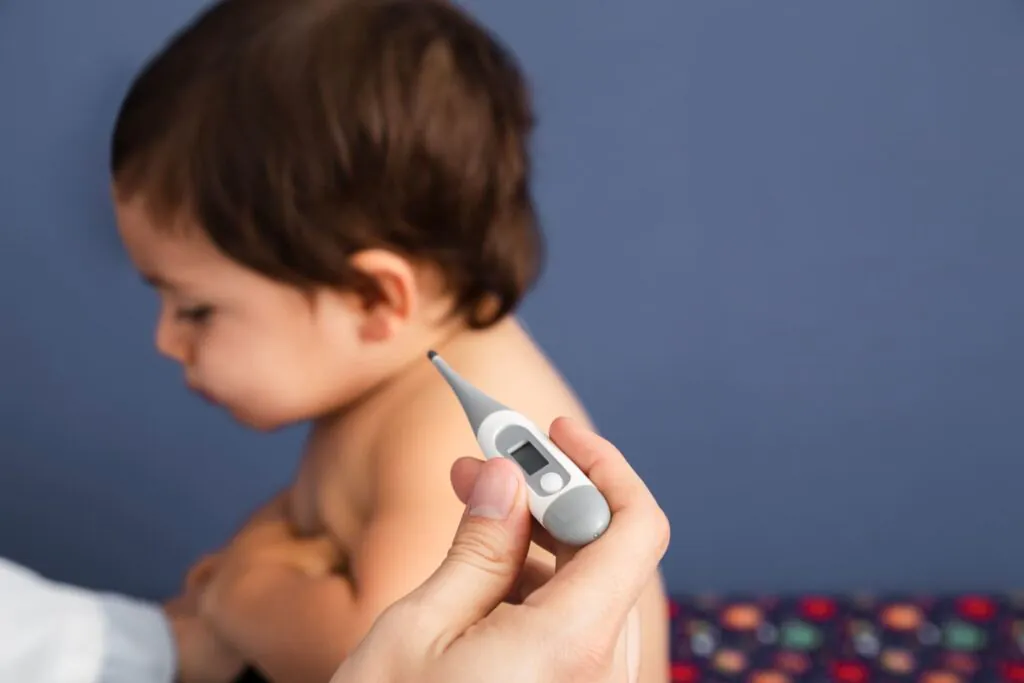
What is Urinary Tract Infection in Babies? What are the Symptoms?
It is not always easy to understand the signs of illness because babies are not yet able to express themselves. However, restlessness and crying for which the cause cannot be determined can sometimes be a sign of a significant health problem. Urinary tract infection (UTI) is one of them. Most parents do not know that urinary tract infections can be seen in babies. However, such infections are common and should be taken into account, especially in the first months when hygiene is critical.
What is Urinary Tract Infection in Babies?
Urinary tract infection is an infection caused by bacteria in the tissues lining the urinary tract. This infection can be especially common in infancy because the immune system is not yet fully developed. The urinary tract consists of four main parts: the kidneys, ureters (the channels between the kidney and the bladder), the bladder, and the urethra (the channel through which urine is expelled). A urinary tract infection usually develops when bacteria move up along the urinary tract and infect one of these organs. In infants, infection occurs most often in the area of the bladder and urethra (cystitis). In more severe cases, the kidneys can be affected, and this condition is called pyelonephritis. Early diagnosis of UTI in infants is important. Because the infection that develops can cause serious complications such as kidney damage. UTIs, which are often difficult to spot, can be treated with good observation and early intervention.
What are the Symptoms of Urinary Tract Infection in Babies?
Urinary tract infection (UTI) in infants can show symptoms that can be confused with other diseases. Therefore, it is important for parents to pay attention to changes in the baby’s behavior and health status.
- High Fever: Unexplained fever above 38°C in infants is one of the most common symptoms of UTI. Fever usually indicates that the infection has spread throughout the body.
- Restlessness and Constant Crying: The baby’s restlessness or crying, the cause of which is not understood, may be a sign of UTI, especially if it is exacerbated when urinating.
- Discomfort When Urinating: Babies may show restlessness while urinating, pull their legs, or have crying spells. This may indicate irritation of the bladder and urinary tract.
- Foul-Smelling or Cloudy Urine: If the baby’s urine smells bad or has a darker and cloudier appearance than usual, it may be a sign of infection.
- Feeding Problems and Loss of Appetite: Loss of appetite is common in babies with UTIs. The baby may refuse breast milk or formula.
- Vomiting and Diarrhea: In infants, the stomach and intestinal system sometimes react to UTIs. Vomiting or diarrhea can be one of the common effects of infection on the body.
- Insufficient Weight Gain: Long-term infections can negatively affect the baby’s weight gain. Because during the infection, the baby may not be fed enough.
What are the Symptoms of Urinary Tract Infection in 2-Year-Old Babies?
Although urinary tract infection (UTI) in 2-year-old babies is more noticeable in terms of symptoms, it can often be confused with other conditions. In this age group, children may show symptoms more clearly that indicate a problem with their body. The most common symptom of a UTI is a high fever. Fever whose cause cannot be explained and does not decrease despite antibiotic treatment should be evaluated. Restlessness and general discomfort that accompanies fever may be a sign that the child is not feeling well due to the infection. Pain and discomfort during urination are important symptoms that indicate UTI in 2-year-old children. The child’s avoidance of urinating, his crying reaction, or his sudden pause while urinating are situations that should be taken into account.
What Causes Urinary Tract Infection in Babies?
Urinary tract infection (UTI) in infants usually occurs when bacteria enter the urinary tract and multiply there. Under normal conditions, the urinary tract has a defense mechanism against bacteria. However, babies’ anatomy and immune system are not fully developed, which can increase the risk of infection. The causes of urinary tract infection in infants include:
- Entry of Bacteria into the Urinary Tract: The most common cause is the passage of Escherichia coli (E. coli) bacteria, which are naturally found in the intestine, from the anus to the urinary tract opening. When these bacteria enter the urinary tract, they can multiply rapidly and cause infection. In female babies, the fact that the urethra is short and located closer to the anus increases this risk.
- Inability to Empty the Bladder: It is important to empty the bladder completely for the healthy functioning of the urinary tract. If the bladder cannot be emptied completely in babies, keeping the urine in the bladder for a long time can prepare a suitable environment for the growth of bacteria. This condition can sometimes be caused by congenital anatomical disorders.
- Vesicoureteral Reflux: Some babies may experience vesicoureteral reflux, which is defined as the reflux of urine from the bladder to the kidneys. This causes the urine to flow backwards and the bacteria to reach the kidneys and cause infection. VUR is an important underlying cause of recurrent infections.
- Immune System Weakness: Since the immune system of babies is not yet fully developed, the body cannot fight bacteria effectively. Weakness increases the risk of infection and can cause the disease to progress faster.
- Hygiene and Diaper Use: Failure to change the diaper frequently or improper cleaning (for example, cleaning the area that needs to be wiped from front to back in the opposite direction) may facilitate the passage of bacteria into the urinary tract. Humid and hot environments also accelerate the proliferation of bacteria.
- Congenital Anomalies: Narrow, obstructed or abnormal urinary tract in infants can facilitate the development of infection by making urine flow difficult. This type of structural problem may be a congenital health condition and is usually diagnosed by detailed examinations.

What Is Good For Urinary Tract Infection In Babies?
Urinary tract infection is a condition that should be handled carefully in infants. Early diagnosis and appropriate treatment help the infection heal quickly and prevent possible complications. However, the most important thing to remember is that the treatment for infection must be done under the supervision of a doctor. Treatment of urinary tract infection in infants usually begins with antibiotics to eliminate the bacterial infection. Based on the results of the urine culture, the doctor determines the bacterium causing the infection and prescribes the most appropriate antibiotic. In mild infections, antibiotics are given orally in liquid form, while in more severe cases, intravenous (IV) treatment may be required. Antibiotic treatment usually takes 7-14 days, and even if the symptoms go away, treatment must be completed for the infection to heal completely.
During treatment, it is important to increase the baby’s fluid intake. Frequent breastfeeding of breastfed babies or increasing the water consumption of babies who have switched to supplementary food helps to clean the urinary tract. In addition, frequent changes of the baby’s diaper and paying attention to the hygiene of the genital area are effective in preventing the spread of infection. Cleaning the genital area should always be done from front to back, and the passage of bacteria into the urinary tract should be prevented. In cases of severe infection, the baby can be hospitalized, especially if the infection has spread to the kidneys (pyelonephritis). In this case, fluid and drug support is provided intravenously. Depending on the severity of the infection, the baby’s kidney functions are also closely monitored. After treatment, the doctor may order a urine test again to make sure that the infection is completely gone. In recurrent infections, advanced imaging methods can be used to understand whether there is an anatomical problem.
How is Urinary Tract Infection Treated in Newborn Babies?
Treatment of urinary tract infection in newborn babies is carried out with a more sensitive approach compared to older babies. Since the immune system of newborns is in the developmental stage, infections can spread faster in this age group and lead to serious complications. Therefore, the diagnosis and treatment of infection in newborns is carried out in a hospital setting. When UTI is diagnosed in newborns, treatment usually begins with intravenous (IV) administration of antibiotics. Intravenous medication allows newborns to fight off infection quickly and can prevent bacteria from spreading into the bloodstream (sepsis) or kidneys. The duration of treatment usually ranges from 10-14 days. In this process, the baby’s fluid balance and vital signs are constantly monitored in the hospital environment. It is also common for newborns to have ultrasound or other imaging tests performed following infection to assess whether there is an underlying congenital anatomical problem (e.g., vesicoureteral reflux) underlying the UTI. Since neonatal infections may recur frequently, long-term follow-up may be required.
With early diagnosis and appropriate treatment, urinary tract infection in infants can heal quickly. However, if left untreated, it can lead to serious kidney damage, so when you notice symptoms of UTI in your baby, you should immediately consult a healthcare professional to get information about “
Frequently Asked Questions About Urinary Tract Infection in Infants
Symptoms of Urinary Tract Infection in Baby Girls
Symptoms of urinary tract infection (UTI) in baby girls can usually progress silently. But some clues are noteworthy. Common symptoms include high fever, loss of appetite, restlessness, crying when urinating, and foul-smelling urine. Due to the anatomical structure of the genital area, the risk of infection is higher in female babies. In addition, if the urine smells bad or appears cloudy, it may also indicate infection. When these symptoms are observed, a doctor should be consulted quickly to prevent the infection from spreading to the kidneys.
What Causes Urinary Tract Infection in Baby Boys?
Urinary tract infection is usually more common in male babies in the first 1 year of age, and the risk is higher in uncircumcised babies. The main reason for this is that bacteria accumulate more easily in the genital area of uncircumcised babies. At the same time, congenital urinary tract abnormalities (for example, vesicoureteral reflux) are also a common cause for
Is Urinary Tract Infection Dangerous in Babies?
UTIs in infants can cause serious complications, especially if left untreated. The infection can spread to the kidneys, leading to serious conditions such as pyelonephritis. Long-term health problems such as permanent damage to the kidneys, hypertension and kidney failure may develop. In newborns, the infection can spread to the bloodstream (sepsis), making it life-threatening. However, with early diagnosis and treatment, these risks can be prevented to a large extent.
When Is A Urinary Tract Infection Dangerous?
UTI becomes dangerous when the infection spreads to the kidneys or passes into the bloodstream. This condition usually manifests itself with symptoms such as high fever, severe weakness, vomiting, diarrhea and loss of appetite. If the infection is left untreated, permanent damage can occur that affects kidney function.





